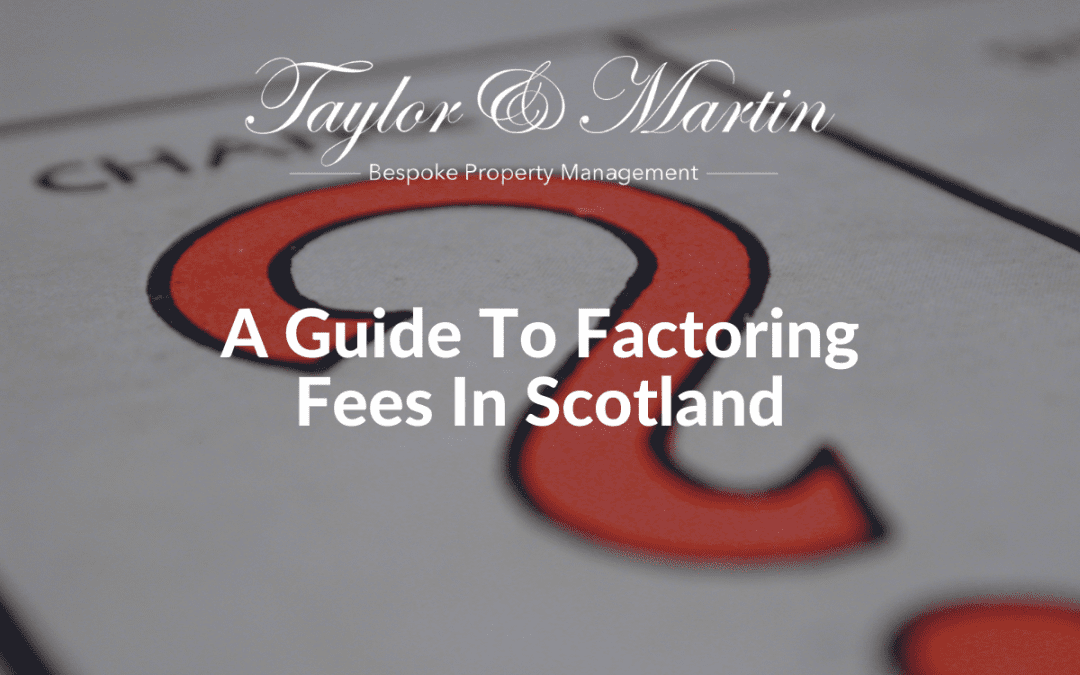Have you found yourself asking where the numbers on your property management bill actually came from? Do you often wonder where your management fee goes?
Factoring can be confusing, especially if you own multiple properties. At Taylor & Martin, we think it’s important to keep it simple. We’re transparent about our fees, and we’re here to help our clients fully understand how the billing process works.
Here’s a comprehensive guide to factoring fees in Scotland.
What do factoring fees cover?
Put simply, at Taylor & Martin our fees cover the factoring service that you can trust, 24/7.
In most cases, factors fees are also made up of your home’s share of insurance and contribution to the building maintenance fund.
It is the property manager’s responsibility to make sure that bills are simple and transparent, and you should be able to request a breakdown of what you are paying and why. If there are any unexpected changes, you should be notified of these in advance.
Taylor & Martin’s factoring fees are regularly reviewed to make sure that we’re providing the highest possible service to our clients, on a tailored and individualised basis.
How does billing for factoring fees work?
In most cases, individual properties in a building or development will be charged a property management fee, usually on a quarterly basis.
Additionally, homeowners are asked to pay into a ‘float’ which is used for small-scale repairs and maintenance; such as cleaning communal areas or replacing light public bulbs. Some factors will also use a ‘building maintenance fund’ so that they have enough money saved over time to prepare for large-scale repairs.
Taylor & Martin holds a floating fund (float) for all homeowners. We use the float to pay contractors for general maintenance and repairs, replenishing the fund when invoices are settled. The value is based on the Deed of Conditions, or an agreed figure based on maintenance and upkeep costs of the property. The floating fund will be reimbursed upon the sale of your property.
No two properties are the same, so at Taylor & Martin, it’s important to us that we offer flexible billing arrangements. To keep things simple, we never charge commission on repairs undertaken on behalf of our clients.
What about if there’s an emergency in my property?
If the worst should happen, your property manager should be on your team to make sure repairs are carried out swiftly and effectively.
As part of your factoring fee, you might be asked to make regular payments to a ‘building maintenance fund’. This fund exists as a safety net to ensure that repairs can always be carried out, taking the pressure off of homeowners to come up with large sums of money if something unexpected should happen.
A factor’s role is sourcing the best contractors for the job. We source quotes from multiple places before carrying out any work. With each repair, factors are required to carry out a cost-benefit analysis, which can be made available to homeowners on request. You should be notified about any additional fees from repairs so that there aren’t any surprises on your bill.
With a trusted roster of contractors on call 24/7 and support with insurance claims, we’ve got your back. Find out more about how we can support you in an emergency.
Choosing the best property manager for you
We know the importance of having a property manager you can depend on and we take that responsibility seriously. Homeowners have legal protection when using a property factor, so understanding how services and fees work is important. This makes sure that you’re getting the most out of your factor.
If you would like to find out more about our factoring services why not get in touch today?

